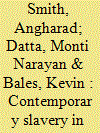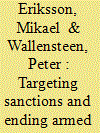|
|
|
Sort Order |
|
|
|
Items / Page
|
|
|
|
|
|
|
| Srl | Item |
| 1 |
ID:
190846


|
|
|
|
|
| Summary/Abstract |
We introduce a new dataset, Contemporary Slavery in Armed Conflict (CSAC), coding instances and types of enslavement in armed conflict from 1989 to 2016, building on Uppsala Conflict Data Program data. CSAC currently covers 171 armed conflicts from 1989 to 2016, with the unit of analysis being the conflict-year. We identify different types of enslavement within these conflicts and find that 87% contained incidences of child soldiers, 34% included sexual exploitation/forced marriage, 23% included forced labor, and 16% contained instances of human trafficking. The use of enslavement in armed conflict to support strategic aims is also identified and found in about 17% of cases. Next, drawing upon key variables from the Uppsala Conflict Data Program, we present a series of cross-tabulations looking at the presence of slavery and conflict broken down by conflict incompatibility, intensity level, and type. We see the coding of slavery within conflict as a step toward generating greater understanding of when and how state and non-state actors use enslavement within conflict, with the goal of mitigating and possibly eradicating slavery in warfare.
|
|
|
|
|
|
|
|
|
|
|
|
|
|
|
|
| 2 |
ID:
142436


|
|
|
|
|
| Summary/Abstract |
Capitalizing on the newly released dataset on United Nations sanctions and armed conflicts, this article raises the question whether targeted sanctions have an impact on the dynamics of armed conflicts, and, if they do, in what way. To answer this question the authors correlate UN sanctions policies to measures related to armed conflict in the period 1991–2013. This is done by systematizing and analysing data produced by the UN Targeted Sanctions Consortium (TSC) and the Uppsala Conflict Data Program (UCDP). It is a first attempt to deal with questions such as the relationship between UN targeted sanctions and armed conflict type, conflict termination and conflict outcome (victory, peace agreements, etc.). The article demonstrates that there are several instances where the UN has decided not to impose targeted sanctions, although the conditions were similar to those cases that saw such action. There is a tendency to use targeted sanctions only in certain types of conflicts. The authors suggest that this is partly rooted in the structure of the UN as an inter-state organization. Thus, sanctions are more of a political instrument than has perhaps been recognized in sanctions research to date.
|
|
|
|
|
|
|
|
|
|
|
|
|
|
|
|
|
|
|
|
|